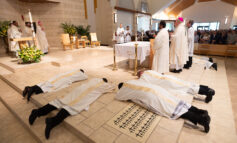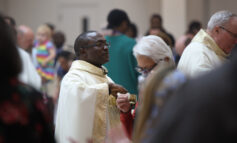By Father Thomas Esposito
Special to The Texas Catholic
The name Ronald Knox is probably unknown to most American Catholics, and that is a great shame. Hailing from a prominent Anglican family of clerics in England, he was one of the most famous Catholic converts of the 20th century. The quality of his writing, and the incisive depth of his faith-filled intellect, rival the likes of better-known contemporaries such as G.K. Chesterton, Hilaire Belloc, and C.S. Lewis.
I mention Msgr. Knox here because he has played a silent but significant role in many of these columns of mine. He published several books of brief reflections on topics related to faith; they were originally written monthly for a newspaper. One such book, entitled Lightning Meditations, contains a short sermon that I would be delightfully content to quote in full here. But lest the reader think I am simply lazy and lacking original ideas, I will paraphrase the master’s thought presented in the reflection called “Our Lord’s Disappearances.”
Msgr. Knox notes something curious about the Gospel accounts of Jesus’ resurrection appearances: they are sporadic, and do not paint the picture of a Jesus present continuously to his disciples. He manifests himself on the road, by the sea-shore, at the table- and then vanishes from sight. We recall his unforgettable encounters with Mary Magdalene in the garden, the two disciples bound for Emmaus, or the eleven in Galilee, and rightly so; yet what are we to make of his disappearances, his retreats even before his permanent departure 40 days after Easter morn?
This sequence of fugitive presences and longer absences on the Lord’s part is actually a familiar refrain. In the Song of Songs, the young bride constantly laments the baffling withdrawals of her beloved, which seem only to further draw out her love as she passionately pursues him. The image of the bride searching madly for her groom was understood by the Jewish rabbis and then Christian theologians as a symbol of the human soul’s desire for union with God. Though Msgr. Knox does not speak of this symbolism in his sermon, he does note that our experience of faith usually reveals a similar pattern: we will, on occasion, feel the presence of God in our heart, or be granted a graced consolation, a clear insight into the mystery of Christ at work within us. Those privileged moments, however, are fleeting and far-between, and our longing to love the risen Lord and accept him as our God, once seemingly natural, gradually cools, like a once-fiery ember choked by accumulated cold ash.
Perhaps in coming to terms with this manner of God’s revelation to us, Msgr. Knox suggests, we can read in the Gospel accounts of Jesus’ resurrection appearances our own interaction with our elusive Lord. Those encounters, however seldom they be, however doubtful we may come to regard them later, can sustain our faith as we wander through the often bitter valley of life. Our Lord’s resurrection appearances and disappearances force us to acknowledge that these moments must nourish us for the duration of our days. Faith is not the substance of fleeting feelings here and there, but the steady walk, whether in light or in apparent darkness.
I leave the final word of encouragement to the good monsignor: “Those days when heaven shone closer to you (or so you fancy) were the memories of his presence you were meant to carry away with you, to last you for a lifetime. Not for you to complain that religion is no longer vivid to you; rather to recall that religion was once vivid to you, and it was the same religion, and the same you. The assent we give to the doctrine of the risen Christ should not be the mood of a moment; it should be the considered judgment of a lifetime.”
Father Thomas Esposito, O.Cist., is a theologian and monk at the Cistercian Abbey of Our Lady of Dallas in Irving. His column appears occasionally in The Texas Catholic.



